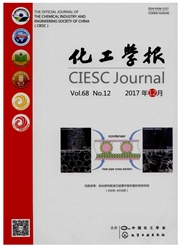

 中文摘要:
中文摘要:
甲醇制低碳烯烃(MTO、MTP)是煤化工的关键环节,近年来相关技术已经在我国成功工业化,包括中国科学院大连化学物理研究所的DMTO技术、中石化的s-MTO技术、UOP的MTO+OCP技术以及Lurgi的MTP技术。从非均相催化反应角度分析甲醇制烯烃的过程特点,剖析了各类典型的非均相催化反应器用于该过程的优劣,对比了国内外各主流技术的关键指标,评述了甲醇制烯烃和催化裂化的异同。分子筛催化的甲醇制烯烃过程遵循烃池机理,呈现自催化和积炭失活特性,控制催化剂的工作状态和限制返混对提高催化活性及烯烃产物选择性尤为重要。具有多级结构的分子筛催化剂及低返混流化床反应器或反应器串联组合是未来的发展方向。
 英文摘要:
英文摘要:
The methanol-to-olefins (MTO) and methanol-to-propylene (MTP) processes are important ways to convert coal to chemicals. Successfully commercialized processes in recent years include the DMTO, s-MTO, MTO+OCP and MTP technologies developed respectively by Dalian Institute of Chemical Physics, SINOPEC, UOP and Lurgi. This paper analyzes the characteristics of the heterogeneous catalytic reactions in the MTO process, and on this basis discusses various multiphase catalytic reactors used for converting methanol to olefins. Key features and specifications of different technologies, and the similarity and difference between the MTO and fluidized catalytic cracking processes are compared. The MTO reactions occur by hydrocarbon pool reaction mechanism, which has autocatalytic and coking deactivation behavior that makes it important to control the working state of the catalyst and limit back-mixing in the reactor to achieve good activity and olefin selectivity. The use of a hierarchical zeolite catalyst and a fluidized bed reactor with little back-mixing or a reactors-in-series assembly is suggested as potential improvement for the process.
 同期刊论文项目
同期刊论文项目
 同项目期刊论文
同项目期刊论文
 The significance of a second adsorption phase withweakly adsorbed species for the calculation of the
The significance of a second adsorption phase withweakly adsorbed species for the calculation of the Differences in the methanol-to-olefins reaction catalyzed by SAPO-34 with dimethyl ether as reactant
Differences in the methanol-to-olefins reaction catalyzed by SAPO-34 with dimethyl ether as reactant A microscopic model of the Tian-Calvet microcalorimeter, cell design for a faster response, and meas
A microscopic model of the Tian-Calvet microcalorimeter, cell design for a faster response, and meas Simultaneous measurement of the concentrations of sootparticles and gas species in light hydrocarbon
Simultaneous measurement of the concentrations of sootparticles and gas species in light hydrocarbon 期刊信息
期刊信息
